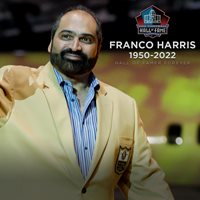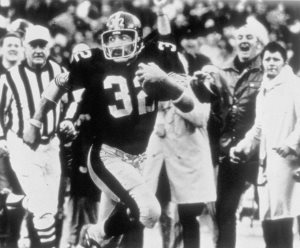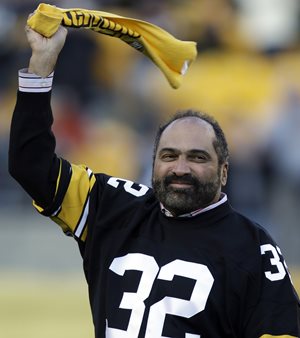Iconic figure, ‘Mr. Pittsburgh,’ Franco Harris: 1950-2022
 The pro football world today is mourning the death of FRANCO HARRIS,(Opens in a new window) a man whose football accomplishments and commitment to team and community reached iconic status in his adopted hometown of Pittsburgh, Pa.
The pro football world today is mourning the death of FRANCO HARRIS,(Opens in a new window) a man whose football accomplishments and commitment to team and community reached iconic status in his adopted hometown of Pittsburgh, Pa.Harris died overnight, his family said. No cause was listed. He was 72.
“Harris’s loyalty to friends, and devotion to teammates, might be his most towering quality,” observed author Gary M. Pomerantz in this book, “Their Life’s Work: The Brotherhood of the 1970’s Pittsburgh Steelers, Then and Now.”
“The entire team at the Pro Football Hall of Fame is immensely saddened today,” Hall President Jim Porter said Wednesday.
“We have lost an incredible football player, an incredible ambassador to the Hall and, most importantly, we have lost one of the finest gentlemen anyone will ever meet. Franco not only impacted the game of football, but he also affected the lives of many, many people in profoundly positive ways,” Porter continued.
“The Hall of Fame and historians everywhere will tell Franco’s football story forever. His life story can never be told fully, however, without including his greatness off the field.
“My heart and prayers go out to his wife, Dana, an equally incredible person, a special friend to the Hall and someone who cares so deeply for Franco’s Hall of Fame teammates.”
Born on March 7, 1950, in Fort Dix, N.J., the son of Cad and Gina Harris, Harris graduated from Rancocas Valley Regional High School and Penn State University.
He was selected by the Pittsburgh Steelers in the first round, the 13th player selected overall, in the 1972 NFL Draft. While there was some debate among ownership, coaches and scouts as to whom the team would select, in hindsight, they selected the only future Pro Football Hall of Famer (Class of 1990) in that year’s draft.
“They (Steelers) had a good, young team but he (Harris) was the missing piece. He gave you that extra dimension. When people played you now, they had to stop him,” offered Steelers running backs coach Dick Hoak in a 1990 Pittsburgh Post-Gazette story.
“What JOE GREENE(Opens in a new window) meant for the defense, setting the tone, that’s what Franco did for our offense,” Steelers Hall of Fame linebacker JACK HAM(Opens in a new window) observed.
Winning was a major part of the tone Harris set. During his 12 seasons in Pittsburgh, the Steelers never posted a losing record.

“When (CHUCK NOLL(Opens in a new window)) drafted Franco Harris, he gave the offense heart, he gave it discipline, he gave it desire, he gave it the ability to win a championship in Pittsburgh,” teammate LYNN SWANN(Opens in a new window) said of Harris in presenting him for enshrinement into the Pro Football Hall of Fame. “He gave us pride by his work ethic.”
Art Rooney Jr., head of the Steelers’ scouting department throughout the Steelers’ dynasty of the 1970s, likened Harris’ arrival to the turning point of U.S. military history: “There’s an old saying: ‘The United States never won a naval battle against the Japanese until Midway and then they never lost a battle.’ Well, the Steelers never really won anything until Franco got here, and never really lost anything until he left.”
Hall of Fame coach Chuck Noll said, “We wanted to be able to run the football. He gave us that something special, and he could go all the way.”
Harris did “go all the way” many times that he touched the ball, and his most famous occasion was the legendary play being celebrated this weekend – the “Immaculate Reception”(Opens in a new window) that lifted the Steelers over the Oakland Raiders in a 1972 playoff game.
“People will never have to ask what the greatest play in Steelers’ history is,” Steelers President DAN ROONEY(Opens in a new window) told The Canton Repository in August 1990, prior to Harris’ enshrinement. “Franco’s Immaculate Reception stands head and shoulders above all the rest. It was a miracle play that just lifted the Steelers to a new level.”
In the documentary, “Immaculate Reception A Football Life,” author Stephen J. Dubner offered, “I think the Immaculate Reception gained momentum in history because the Steelers then went on to win four Super Bowls in six years. It becomes the cornerstone of this fantastic edifice they begin to build.”
Longtime football writer and former Hall of Fame selector Vito Stellino compared Harris to other artistic masters.
“Imagine Picasso with a brush, Louis Armstrong with a horn or Hemmingway with a pen. That’s how it is when Franco Harris runs with a football. He is the consummate artist,” Stellino wrote in Football Digest.
During Harris’ tenure in Pittsburgh, he played in Super Bowls IX, X, XIII and XIV, earning the MVP Award in Super Bowl IX, the first league title in Steelers’ history. Pittsburgh won each of those Super Bowls.
Journalist Dave Anderson once described Harris’ postseason efforts as “pre-eminent.”
Harris accumulated 12,120 career rushing yards on 2,949 carries in his 173 regular-season games. Always a threat in the passing game, too, he added 307 receptions for 2,287 receiving yards. He amassed eight 1,000-yard rushing seasons, scored 100 touchdowns, appeared in nine Pro Bowls and was selected to the NFL’s All-Decade Team of the 1970s.
At the time of his retirement, Harris held or shared 24 NFL records.
After a dozen seasons in Pittsburgh, Harris played one year with the Seattle Seahawks, providing leadership on a team that finished with a 12-4 record and the AFC’s West Division title.
Steelers founder ART ROONEY SR.(Opens in a new window) called Harris’ departure “the most frustrating thing that ever happened to me in all my years in sports,” in a Post-Gazette article.
In addition to being enshrined in the Pro Football Hall of Fame, Harris was a member of the 2017 inaugural class of the Steelers Hall of Honor and was inducted into the New Jersey Hall of Fame in 2011.
Harris’ commitment to his teammates and to his community was as legendary as his on-field performance.
Joe Gordon, the longtime public relations director for the Steelers, observed that Harris was disciplined in his personal and professional life, noting that Harris performed more work for charity than any other member of the team.
“He was the best of all time. Nobody was close,” Gordon said. “He never turned you down, regardless of the circumstances. When he gave someone his word, that was it. You could take it to the bank. He’s a phenomenal human being.”
 Harris’ willingness to get involved in so many charities and causes – some seemingly at the same time – in Pittsburgh inspired Ham to state: “I swear, I think he’s cloned.”
Harris’ willingness to get involved in so many charities and causes – some seemingly at the same time – in Pittsburgh inspired Ham to state: “I swear, I think he’s cloned.”Those community efforts were recognized when Harris was awarded the Walter Payton Man of the Year Award in 1976. The award recognizes NFL players who have exhibited excellence on the field and whose passion to impact lives extends beyond the game.
“He was as principled as any Steeler” he’d ever known, Dan Rooney said in Pomerantz’s book.
Harris often mentioned he “had some of the greatest teammates of all time,” and those teammates often became friends.
“I look at friends like, ‘When you’re down to your last point of life, who would you look to?’ For me it would have to be Franco Harris.” J.T. Thomas said, adding,
“Franco looks at thing on merit. He doesn’t look at faults. That’s what friends do. They help you when you have a need, not when the sun is shining, but in hurricanes and storms.”
In a statement released Wednesday afternoon, longtime teammate MEL BLOUNT(Opens in a new window) called Harris “the most decent human being I have ever known.”
“Franco was a great football player but even a better person. He always made time for others. ... Franco was a huge supporter of the Mel Blount Youth Leadership Initiative and poured his heart out to every youth organization throughout the Pittsburgh community,” Blount said. “I am grateful for our friendship. I will truly miss my brother, teammate and dear friend.”
Utilizing his Penn State University degree in Food Service and Administration, Harris created Super Bakery, Inc. The enterprise provided nutritional baked goods to schools, military units and health care markets. Harris later created Silversport, providing antimicrobial fitness and workout gear.
In a Forbes video, Harris credited Pittsburgh Pirates legend Willie Stargell with providing a valuable lesson when he suggested to Harris, “‘When you’re out and about and you’re working and dealing with the public, how you act is very important. Always act like you have your little brother by your side and you want to set a good example for him.’ I took that and even applied it toward my business.”
Harris also believed one should “learn your business from the ground up. You can never have enough money for what you don’t know.”
Prior to the 1972 NFL Draft, Harris declared, “Wherever I go play, I want to live in that city and get involved in that city, become that city.”
Through Harris’ efforts on the football field, at community and civic events and in business, he accomplished his pre-draft declaration.
Joe Greene put it simply when he referred to Harris as “Mr. Pittsburgh.”
That legacy will be guarded forever at the Pro Football Hall of Fame in Canton.
Man of impeccable integrity, Art McNally: 1925-2023
The football world today is celebrating the life and legacy of ART MCNALLY, a former NFL on-field official and supervisor of officials who had an immense impact on the game of professional football.
A true game changer — Ray Guy: 1949-2022
The football world today is celebrating the life of Ray Guy, a man of many firsts who proclaimed in his speech as the Pro Football Hall of Fame’s first pure punter enshrined: “Now the Hall of Fame has a complete team.”

